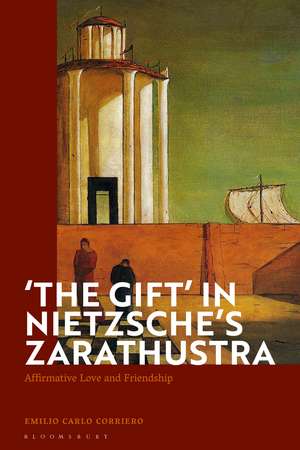'The Gift' in Nietzsche's Zarathustra: Affirmative Love and Friendship
Autor Emilio Carlo Corrieroen Limba Engleză Paperback – 22 mar 2023
| Toate formatele și edițiile | Preț | Express |
|---|---|---|
| Paperback (1) | 188.82 lei 6-8 săpt. | |
| Bloomsbury Publishing – 22 mar 2023 | 188.82 lei 6-8 săpt. | |
| Hardback (1) | 470.03 lei 3-5 săpt. | +21.77 lei 6-10 zile |
| Bloomsbury Publishing – 25 aug 2021 | 470.03 lei 3-5 săpt. | +21.77 lei 6-10 zile |
Preț: 188.82 lei
Nou
Puncte Express: 283
Preț estimativ în valută:
36.15€ • 37.18$ • 29.99£
36.15€ • 37.18$ • 29.99£
Carte tipărită la comandă
Livrare economică 19 februarie-05 martie
Preluare comenzi: 021 569.72.76
Specificații
ISBN-13: 9781350212299
ISBN-10: 1350212296
Pagini: 142
Dimensiuni: 156 x 234 x 25 mm
Greutate: 0.21 kg
Editura: Bloomsbury Publishing
Colecția Bloomsbury Academic
Locul publicării:London, United Kingdom
ISBN-10: 1350212296
Pagini: 142
Dimensiuni: 156 x 234 x 25 mm
Greutate: 0.21 kg
Editura: Bloomsbury Publishing
Colecția Bloomsbury Academic
Locul publicării:London, United Kingdom
Caracteristici
Connects the last phase of Nietzsche's thought to the notion of 'the gift' in the history of philosophy
Notă biografică
Emilio Corriero is Assistant Professor of Philosophy at the University of Turin, Italy.
Cuprins
Introduction1. The dynamics of giving 2. The greatest gift3. For whom the sun shines4. About the new loveAfterword NotesBibliography Index
Recenzii
Emilio Corriero offers an original reading of Nietzsche's masterpiece Thus Spoke Zarathustra that emphasizes the importance of generosity and the gift of wisdom. Subtle and provocative, but also thoughtful and systematic, Corriero shows how the wisdom of love and friendship is key to Nietzsche's remarkable text.
How to think the gift beyond the obligation to reciprocate but without simply distinguishing between two types of 'gift', one of which would oblige exchange while the other would simply give without reserve, a Bataillean expenditure without end? Corriero answers the question by tracing the precise relation between Zarathustra's 'bestowing virtue' of overflowing wisdom and the Christian God's unstinting love for mankind. Only the true friend, who shares our eager anticipation of the Overman, is capable of receiving such a present.
How to think the gift beyond the obligation to reciprocate but without simply distinguishing between two types of 'gift', one of which would oblige exchange while the other would simply give without reserve, a Bataillean expenditure without end? Corriero answers the question by tracing the precise relation between Zarathustra's 'bestowing virtue' of overflowing wisdom and the Christian God's unstinting love for mankind. Only the true friend, who shares our eager anticipation of the Overman, is capable of receiving such a present.
